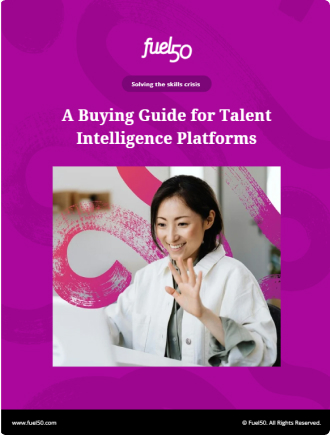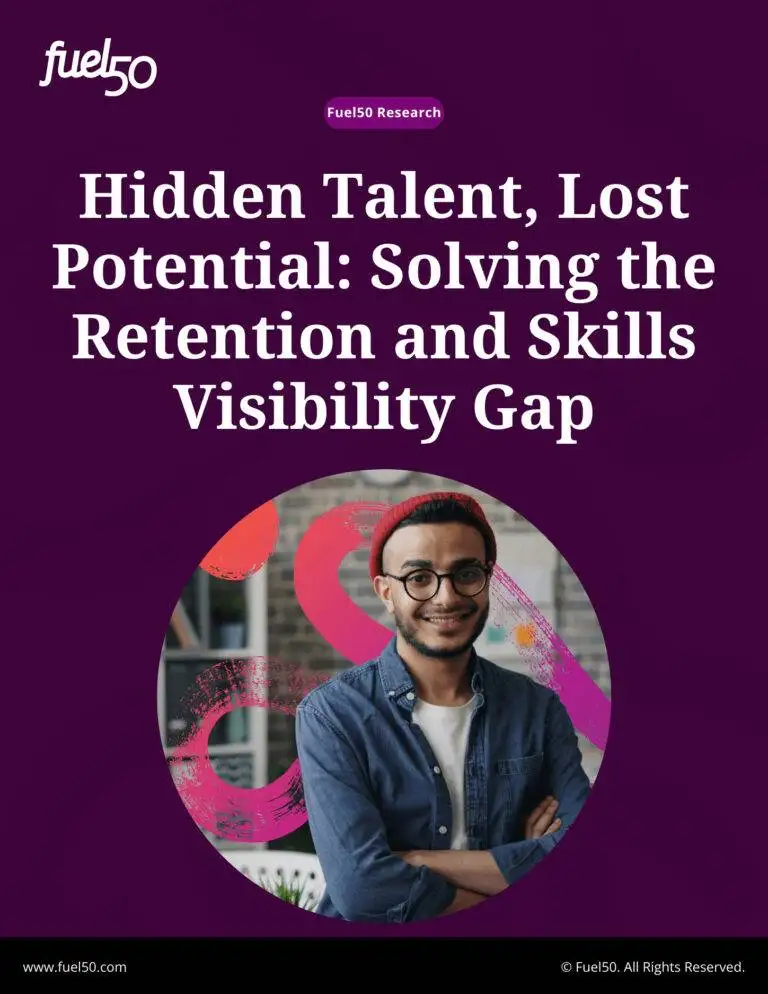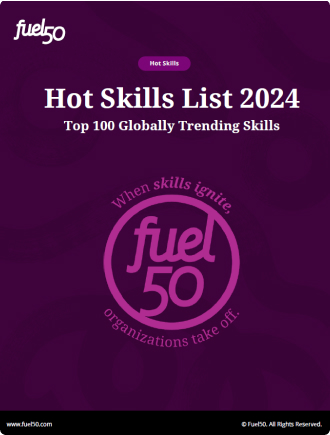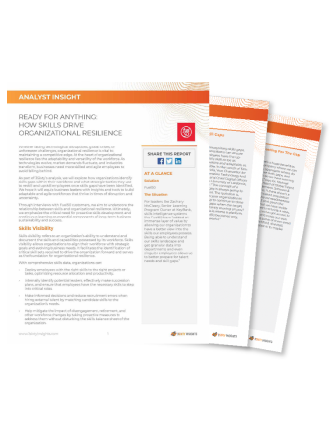Imagine walking into your office on Monday morning to find that your star product manager, the one who just led a game-changing launch, has handed in her resignation. Her reason? “I feel like I’ve hit a ceiling here.”
As you watch years of institutional knowledge and potential walk out the door, you can’t help but wonder: Could this have been prevented?
This scenario plays out in companies every day, costing them not just talent, but also time, money, and competitive edge. The culprit? A lack of internal talent mobility.
In a world where skills become obsolete faster than ever, and employees crave constant growth, the traditional “up or out” career model is falling woefully short.
It’s not just about moving people around; it’s about creating a dynamic ecosystem where skills flow to where they’re needed most, and employees can continually reinvent themselves instead of jumping ship.
In this article, we’ll dive into why talent mobility has become a critical strategy for enterprise companies. We’ll explore its key benefits, from boosting retention to fostering innovation, and provide a roadmap for implementing an effective talent mobility program.
What is talent mobility?
Talent mobility refers to the strategic process of moving employees within an organization to new roles, departments, or locations. It’s a key component of a modern talent management strategy, focusing on leveraging existing employees’ skills and potential to fill various positions within the company.
At its core, talent mobility is about creating opportunities for employees to grow, develop new skills, and advance their careers without leaving the organization. This approach recognizes that employees’ aspirations and capabilities evolve over time, and provides a talent mobility framework for aligning these changes with the organization’s needs.
There are two primary types of talent mobility:
-
Vertical mobility: This involves moving employees up the organizational hierarchy, typically through promotions.
For example, a marketing manager might be promoted to marketing director, taking on more responsibilities and a higher-level role.
-
Horizontal mobility: Also known as lateral moves, this type of mobility involves moving employees to different roles at the same level.
For instance, an executive assistant supporting the Chief Marketing Officer might transition to supporting the Chief Human Resources Officer, broadening their experience without necessarily changing their job level.
It’s worth noting that the terms “talent mobility,” “internal mobility,” and “internal talent mobility” are often used interchangeably. All these terms describe the practice of moving current employees into new positions within the company, whether it’s a promotion within their current department or a move to an entirely different area of the business.
Talent mobility goes beyond simple job rotations or temporary assignments. It’s a comprehensive strategy that involves identifying employees’ skills and potential, understanding their career aspirations, and aligning these with the organization’s current and future needs. This approach not only helps fill open positions but also contributes to employee development, engagement, and retention.
What are the benefits of talent mobility for your organization?
Talent mobility has become a critical business strategy, backed by compelling data and success stories from leading organizations. Let’s explore how it drives key benefits for enterprises.
Talent mobility supercharges retention rates
By offering clear pathways for growth within your organization, talent mobility gives your top performers compelling reasons to stay put.
This isn’t just about keeping bodies in seats; it’s about nurturing a workforce that’s deeply invested in your company’s future.
KeyBank is a perfect example of this. After implementing their “Grow at Key” program using Fuel50’s talent marketplace platform, they saw a remarkable 72% of users return to the platform for more gigs, projects, and career pathing.
This high engagement with internal opportunities speaks volumes about the program’s effectiveness in keeping employees interested and invested in their future with the company.
But the benefits don’t stop at retention. When employees see a future with your company, they’re more likely to go above and beyond in their current roles. It’s a virtuous cycle of engagement and performance that can transform your entire organization.
Bridging skills gaps becomes second nature
Talent mobility allows you to nurture the potential already within your ranks, turning skill gaps into opportunities for growth. Instead of constantly looking outside for new talent, you’re cultivating a workforce that evolves with your needs.
Take Texas Health Resources, for example. They’ve leveraged Fuel50’s platform to map out their employees’ current skills and career goals. This approach allowed them to proactively identify skills gaps and address them by aligning employee aspirations with organizational needs.
Organizational agility gets a major boost
Talent mobility is like oiling the gears of your organization, allowing you to quickly shift resources where they’re needed most. This agility is crucial in a business landscape where change is constant and unpredictable.
CarTrawler’s experience illustrates this perfectly. By implementing Fuel50’s talent marketplace, they’ve been able to help employees discover new internal opportunities quickly and efficiently.
This has allowed them to fill critical roles faster with people who already understand the company culture and processes. The result? A more responsive, adaptable organization that can pivot quickly to meet new challenges.
Knowledge preservation and transfer become ingrained in your culture
Every long-time employee carries years of invaluable institutional knowledge. Talent mobility helps spread this wisdom across your organization, creating a culture of continuous learning and innovation.
RTI International’s use of Fuel50’s platform showcases this beautifully. They found that 31% of mentors in their program had dedicated 10-20 years of service to the organization. These seasoned employees were able to share their wealth of knowledge across different departments, fostering a culture of continuous learning and innovation.
It’s not just about preserving knowledge; it’s about amplifying it and using it to drive your organization forward.
Employee engagement and motivation skyrocket
When employees see a clear path for advancement within your organization, they’re more likely to be engaged, motivated, and productive. It’s about creating a culture where growth and development are woven into the fabric of everyday work life.
Allied Irish Banks (AIB) saw this principle in action when they implemented their talent mobility program using Fuel50. An impressive 96% of their employees engaged with the platform, revealing skills and aspirations that might have otherwise gone unnoticed.
This high level of engagement demonstrates how talent mobility can transform an organization from the inside out.
Cultural reinforcement becomes a natural byproduct
Your company culture isn’t static; it’s a living, breathing entity that’s shaped by your employees’ experiences and interactions. Talent mobility can be a powerful tool for reinforcing and spreading your cultural values across the organization.
University of California, Irvine (UCI) provides a compelling example. Their implementation of Fuel50’s talent marketplace has not only increased internal mobility but also strengthened their culture of learning and development.
By giving employees visibility into growth opportunities and potential career paths, UCI has opened up a world of possibilities for their workforce. This has resulted in increased employee engagement and a stronger, more cohesive organizational culture.
Five key components of a talent mobility process
A successful talent mobility strategy isn’t built overnight. It requires careful planning and several interconnected components working in harmony. Let’s explore these essential elements and how they contribute to a robust workplace skills plan.
Clear guidelines and policies
At the foundation of any effective talent mobility process are clear, well-communicated guidelines and policies. These serve as the roadmap for both employees and managers, outlining how talent mobility works within your organization.
Think of these guidelines as the rules of the game. They should cover everything from how employees can express interest in new roles to the criteria for internal moves.
For instance, you might have a policy that employees need to be in their current role for at least a year before being eligible for a move. Or you could outline a process for managers to recommend team members for new opportunities.
Clear policies do more than just set expectations; they create a sense of fairness and transparency. When everyone understands the rules, it reduces potential conflicts and ensures that talent mobility is seen as an equitable process. This, in turn, encourages more employees to engage with the program, amplifying its impact on your overall skills development strategy.
Detailed job descriptions
You can’t hit a target you can’t see. That’s why detailed, up-to-date job descriptions are crucial for talent mobility. These descriptions serve as the compass, guiding employees towards roles that match their skills and aspirations.
But we’re not talking about generic, one-size-fits-all job descriptions. Each role should have a comprehensive breakdown of required skills, responsibilities, and growth opportunities. This level of detail allows employees to assess their fit for different positions accurately.
For example, instead of simply listing “good communication skills” as a requirement, a detailed job description for a project manager role might specify “ability to facilitate cross-functional team meetings and present project updates to senior leadership.” This specificity helps employees understand exactly what’s expected and how their current skills align with the role.
Detailed job descriptions also play a crucial role in identifying skills gaps across your organization. By comparing your current talent pool against these detailed requirements, you can pinpoint areas where additional training or recruitment might be necessary.
Skills mapping and career planning
Skills mapping and career planning form the engine of your talent mobility process. This component involves creating a comprehensive inventory of the skills present in your organization and helping employees chart their career paths.
Imagine having a dynamic, real-time map of all the skills in your company. This map would show not just what skills employees currently have, but also what skills they’re developing and aspiring to gain. Such a tool would be invaluable for both strategic workforce planning and individual career development.
On an individual level, career planning helps employees see potential growth paths within the organization. It might involve tools that allow employees to explore different roles, understand the skills required for each, and create personalized development plans to bridge any gaps.
For instance, a marketing associate might use this system to explore paths into digital strategy, content creation, or marketing analytics. They could then see what skills they need to develop for each path and create a plan to acquire those skills over time.
By linking skills mapping with career planning, you create a powerful synergy. Employees can see clear paths for growth, while the organization gains a better understanding of its internal talent pool and future skills needs.
Employee feedback mechanisms
Talent mobility isn’t a one-way street. To truly succeed, it needs to be a dialogue between the organization and its employees. That’s where robust feedback mechanisms come into play.
These mechanisms should provide multiple channels for employees to share their thoughts, aspirations, and concerns about the talent mobility process. This could include regular surveys, one-on-one career conversations with managers, or even an open forum where employees can suggest improvements to the program.
For example, you might implement a quarterly “career check-in” where employees discuss their goals and experiences with the talent mobility program. Or you could have an anonymous suggestion box where employees can share ideas for new learning opportunities or internal gigs.
The key is to not just collect this feedback, but to act on it. When employees see their input leading to real changes, it boosts engagement with the program and helps create a culture of continuous improvement.
Learning and development opportunities
The final piece of the puzzle is providing ample learning and development opportunities. After all, talent mobility isn’t just about moving people around; it’s about helping them grow into new roles and responsibilities.
This component should offer a diverse range of learning options to cater to different learning styles and career paths. It might include traditional training courses, mentorship programs, job shadowing opportunities, or access to online learning platforms.
For instance, you might offer a “leadership track” program for employees interested in management roles. This could combine online courses on leadership skills with real-world practice through stretch assignments or temporary leadership roles on cross-functional projects.
The key is to align these learning opportunities with both individual career goals and organizational needs. By doing so, you ensure that your talent mobility program is not just moving people around, but actively developing the skills your organization needs to thrive.
How to develop an effective talent mobility strategy?
Creating a successful talent mobility strategy isn’t a one-size-fits-all process. It requires careful planning, execution, and ongoing refinement.
Let’s walk through the key steps to develop a strategy that will transform your organization’s approach to talent management.
Get executive buy-in
The journey to effective talent mobility begins at the top. Without executive buy-in, even the most well-designed strategy can falter. Your leadership team needs to understand and champion the value of talent mobility.
Start by presenting a compelling business case. Highlight how talent mobility can address pressing organizational challenges, such as skills gaps, retention issues, or succession planning. Use data to illustrate the potential impact.
For instance, you might share research showing that companies with strong internal mobility retain employees for almost twice as long.
When executives are on board, they can allocate necessary resources, remove obstacles, and set the tone for the entire organization. Their visible support sends a powerful message about the importance of internal career development.
Create a talent mobility task force
With executive support secured, it’s time to assemble your talent mobility dream team. This task force will be responsible for designing, implementing, and overseeing your talent mobility program.
Include representatives from various departments and levels within your organization. HR should certainly be at the table, but don’t stop there. Invite managers who have successfully developed their team members, employees who have made successful internal moves, and representatives from key business units.
This diverse group brings different perspectives and helps ensure your strategy addresses the needs of the entire organization. They can also serve as ambassadors for the program, spreading enthusiasm and answering questions across the company.
Assess your current talent pool
Before you can map out where you’re going, you need to know where you stand. A thorough assessment of your current talent pool provides the foundation for your mobility strategy.
Start by taking stock of the skills, experiences, and aspirations of your workforce. This might involve surveys, skills assessments, or career conversations. Don’t just focus on hard skills –– consider soft skills, potential, and career goals as well.
At the same time, analyze your organization’s current and future talent needs.
-
Where are your skills gaps?
-
What roles are consistently hard to fill?
This comparison between your current talent and your talent needs will help you identify opportunities for internal mobility and development.
Define talent mobility goals
With a clear picture of your talent landscape, you can set meaningful goals for your mobility program. These should align with your broader organizational objectives and address the gaps identified in your talent assessment.
Your goals might include increasing internal fill rates for key positions, improving employee retention, or developing a stronger leadership pipeline. Be sure to set both short-term and long-term goals.
For example, a short-term goal might be to fill 50% of management positions internally within the next year, while a long-term goal could be to have 80% of your executive team promoted from within over the next five years.
Make your goals SMART: Specific, Measurable, Achievable, Relevant, and Time-bound. This will help you track progress and demonstrate the impact of your program.
Develop policies and procedures
Clear, fair policies and procedures are the backbone of any successful talent mobility program. They provide structure and ensure consistency in how internal opportunities are identified, communicated, and filled.
Consider questions like: How often can employees apply for internal moves? What approvals are needed? How will you handle situations where a manager doesn’t want to “lose” a high-performing employee?
Your policies should strike a balance between encouraging mobility and maintaining operational stability.
For instance, you might require employees to be in their current role for a minimum period before applying for internal moves, but make exceptions for high-potential individuals or critical skill areas.
Implement a tracking system
To manage and measure your talent mobility efforts effectively, you need a robust tracking system. This could be part of your existing HRIS or a standalone talent management platform.
Your system should track internal applications, moves, and outcomes. It should also capture skills data, career aspirations, and development plans. This wealth of data will allow you to identify trends, measure the success of your program, and make data-driven decisions to refine your strategy.
For example, you might discover that employees who participate in cross-functional projects are more likely to make successful internal moves. This insight could inform your approach to employee development and assignment of stretch projects.
Communicate the program to employees
Even the best-designed talent mobility program won’t succeed if employees don’t know about it or don’t understand how to participate. Clear, ongoing communication is crucial.
Launch your program with fanfare. Consider a company-wide event or a series of information sessions. Explain the benefits of the program, how it works, and how employees can get involved. Share success stories of internal moves to inspire and motivate.
Don’t stop at the launch. Keep the momentum going with regular updates, reminders about open internal positions, and celebrations of successful internal moves. Use a mix of communication channels – email, intranet, team meetings – to ensure your message reaches everyone.
Remember, developing an effective talent mobility strategy is an ongoing process. As you implement these steps, continuously gather feedback, monitor results, and be prepared to adjust your approach.
Best practices for implementing talent mobility
Implementing a successful talent mobility program isn’t just about putting processes in place. It’s about creating a culture that values growth, transparency, and continuous learning.
Let’s explore some best practices that can help your organization make the most of its talent mobility efforts.
Align with organizational goals
The foundation of any successful talent mobility program is its alignment with your organization’s broader goals. This alignment ensures that your mobility efforts aren’t just shuffling people around, but actively contributing to your company’s success.
Start by asking yourself: What are our key business objectives for the next few years? How can internal mobility support these goals? For instance, if your company is planning to expand into new markets, your talent mobility program could focus on developing employees with international experience or language skills.
This alignment also helps in gaining buy-in from leadership. When executives can see how talent mobility directly supports business objectives, they’re more likely to champion the initiative. It transforms talent mobility from a nice-to-have HR program into a strategic business imperative.
Use technology and data analytics
In today’s digital age, leveraging technology and data analytics isn’t just an option – it’s a necessity for effective talent mobility. The right tech tools can streamline processes, provide valuable insights, and enhance the overall experience for both employees and managers.
Consider implementing a talent marketplace platform that uses technology to match employees’ skills and aspirations with available opportunities. This not only makes the process more efficient but also reduces bias in internal hiring decisions. Data analytics can help you track the success of your program, identifying trends in internal moves and their impact on employee retention and performance.
For example, you might discover that employees who make a lateral move within their first three years at the company are 20% more likely to stay for five years or more. This kind of insight can shape your talent mobility strategies and help you demonstrate the program’s value to key stakeholders.
Foster a culture of continuous learning
Talent mobility and continuous learning go hand in hand. To move into new roles, employees need to constantly expand their skills and knowledge. By fostering a culture of continuous learning, you’re not just supporting talent mobility – you’re future-proofing your workforce.
Encourage employees to set aside time for learning, whether it’s through online courses, internal training sessions, or on-the-job experiences. Make learning a part of performance discussions and career planning conversations. You might even consider implementing a learning stipend or dedicated learning days to underscore your commitment to employee development.
Remember, learning isn’t just about formal training. Encourage knowledge sharing within your organization. This could be as simple as setting up lunch-and-learn sessions where employees share their expertise with colleagues, or as structured as a formal mentorship program.
Provide transparency in opportunities
Transparency is key to a successful talent mobility program. If employees don’t know about available opportunities, they can’t take advantage of them. Make sure that all internal job openings are clearly communicated and easily accessible to all employees.
Consider creating a centralized job board for internal opportunities, complete with detailed job descriptions and required skills. Go a step further by providing visibility into potential career paths within the organization. This could be in the form of career maps that show possible progression routes across different departments.
Transparency also extends to the selection process for internal moves. Clearly communicate how decisions are made and provide constructive feedback to unsuccessful candidates. This openness builds trust in the process and encourages continued participation.
Offer mentorship and coaching
Mentorship and coaching play a crucial role in supporting talent mobility. They provide employees with guidance, support, and insider knowledge that can be invaluable when navigating internal moves or stepping into new roles.
Set up a formal mentorship program that pairs experienced employees with those looking to grow their careers. This not only supports the mentee’s development but also gives mentors an opportunity to develop their leadership skills.
Coaching, whether from managers or professional coaches, can help employees identify their strengths and areas for development, set career goals, and create action plans to achieve them. For instance, an employee considering a move from a technical role to a management position might benefit from coaching on leadership skills and people management.
Implement your talent mobility programs by leveraging Fuel50
While Fuel50 isn’t exclusively a talent mobility tool, our comprehensive talent marketplace platform offers several features that significantly support and enhance internal mobility efforts.
Here’s how Fuel50 can have an impact on your talent mobility program:
Help you identify and match talent to internal mobility opportunities
Fuel50’s expert-driven skills ontology goes beyond traditional job matching methods. It creates a detailed map of skills across your organization, allowing you to identify potential candidates for internal moves based on their actual capabilities rather than just their current roles.

The platform’s career pathing tools enable employees to visualize potential trajectories within your organization, helping you spot hidden talent that aligns with your talent mobility needs.
By combining skills mapping with career aspirations, Fuel50 helps you create a more nuanced and accurate picture of your talent pool.
This approach ensures you’re not just filling positions but matching the right talent to the right roles for long-term success and employee satisfaction.
Bring visibility into skills gaps and development needs
One of the challenges in talent mobility is understanding where your employees need to grow to take on new roles. Fuel50 addresses this by providing comprehensive skills gap analysis.

The platform compares the current skills of employees against the requirements of various positions, highlighting areas where development is needed for successful transitions.
This visibility allows you to create targeted development plans for your employees. Instead of generic training, you can focus on the specific skills and experiences each individual needs to be ready for their desired or potential new roles.
This targeted approach not only accelerates development but also ensures a better fit when internal moves occur.
Foster a culture of continuous learning and development
Fuel50’s personalized learning and development recommendations transform talent mobility from a reactive process to a proactive, ongoing effort. The platform offers tailored suggestions for courses, resources, and experiences that align with both the employee’s career goals and your organization’s needs.
Moreover, the platform’s gig marketplace feature allows employees to take on short-term projects or assignments in different parts of the business.

This experiential learning is crucial for developing versatile employees who can easily transition between roles and departments.
By integrating learning and development so closely with talent mobility, Fuel50 helps create a culture where employees are constantly preparing for new opportunities within the organization.
Enhance retention of employees
Talent mobility isn’t just about filling positions; it’s about retaining talent. Fuel50’s focus on career growth and development plays a crucial role in keeping your employees engaged and committed to your organization.
The platform’s transparency about internal talent opportunities and development paths gives employees a clear vision of their future within your company.
Furthermore, Fuel50’s mentoring features facilitate connections between employees across different departments.

These relationships not only aid in knowledge transfer but also help employees feel valued and invested in, increasing their likelihood of seeking growth opportunities within your organization rather than looking elsewhere.
Provide data-driven insights for strategic workforce planning
Effective talent mobility requires a deep understanding of your current talent landscape and future needs. Fuel50’s analytics capabilities provide valuable insights that can inform your talent mobility strategy.
The platform can help you identify trends in skill development, track the progress of internal moves, and even predict future skill needs based on your organization’s direction.
These insights allow you to take a more proactive approach to internal mobility. Instead of simply reacting to vacancies as they occur, you can strategically develop your talent pipeline to meet future needs across all departments.

This data-driven approach ensures your internal mobility efforts align closely with your overall business strategy, creating a more resilient and adaptable organization.











